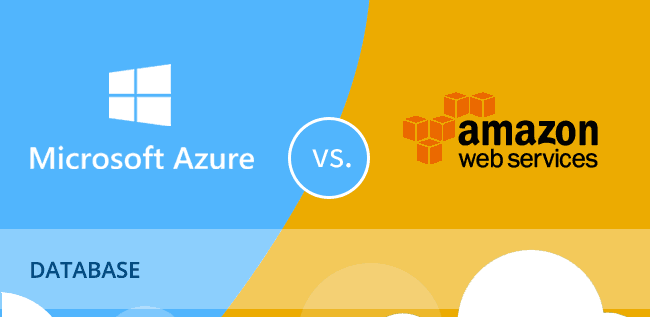
This is our fourth blog in the series of blogs intended to help you embark on a cloud strategy, most importantly when you are in dilemma to choose AWS or Azure, the two prominent cloud players today.
If you had missed our earlier blogs, click here
Before we jumpstart on the actual comparison chart of Azure and AWS, we would like to bring you some basics on the database aspect of cloud strategy. If you would rather like to have quick look at the database comparison table, click here |
Through this blog, let’s understand the database aspect of your cloud strategy. As per the guide, Database services refers to options for storing data, whether it’s a managed relational SQL database that’s globally distributed or a multi-model NoSQL database designed for any scale.
When you decide cloud, one of the critical decisions you face is which database to use – SQL or NoSQL. Though SQL has an impressive track record, NoSQL is not far behind as it is gradually making notable gains and has many proponents. Once you have picked your database, the other big decision to make is which cloud vendor to choose amongst the many vendors.
Here’s where you consider Gartner’s prediction; the research company published a document that states
“Public cloud services, such as Amazon Web Services (AWS), Microsoft Azure and IBM Cloud, are innovation juggernauts that offer highly operating-cost-competitive alternatives to traditional, on-premises hosting environments.
Cloud databases are now essential for emerging digital business use cases, next-generation applications and initiatives such as IoT. Gartner recommends that enterprises make cloud databases the preferred deployment model for all new business processes, workloads, and applications. As such, architects and tech professionals should start building a cloud-first data strategy now, if they haven’t done so already”
Reinstating the trend, recently Gartner has published a new magic quadrant for infrastructure-as-a-service (IaaS) that – surprising nobody – has Amazon Web Services and Microsoft alone in the leader’s quadrant and a few others thought outside of the box.
Now, the question really is, Azure or AWS for your cloud data? Or should it be both? Here’s a quick comparison table to guide you.
| Service | Description | AWS | Azure |
|---|---|---|---|
| Relational database | SQL Database is a high-performance, reliable, and secure database you can use to build data-driven applications and websites, without needing to manage infrastructure. | RDS | SQL Database including Postgres and MySQL |
| NoSQL—document storage | A globally-distributed, multi-model database that natively supports multiple data models: key-value, documents, graphs, and columnar. | DynamoDB | Cosmos DB |
| NoSQL—key/value storage | A non-relational data store for semi-structured data. | DynamoDB and SimpleDB | Table Storage |
| Caching | An in-memory–based, distributed-caching service that provides a high-performance store typically used to offoad non-transactional work from a database. | ElastiCache | Redis Cache |
| Database migration | Focuses on migration of database schema and data from one database format to a specifc database technology in the cloud. | Database Migration Service (Preview) | SQL Database Migration Wizard |
Click here to read the entire guide published by Microsoft Azure Team:
Share this:

CloudIQ is a leading Cloud Consulting and Solutions firm that helps businesses solve today’s problems and plan the enterprise of tomorrow by integrating intelligent cloud solutions. We help you leverage the technologies that make your people more productive, your infrastructure more intelligent, and your business more profitable.
LATEST THINKING
INDIA
Chennai One IT SEZ,
Module No:5-C, Phase ll, 2nd Floor, North Block, Pallavaram-Thoraipakkam 200 ft road, Thoraipakkam, Chennai – 600097
© 2023 CloudIQ Technologies. All rights reserved.

